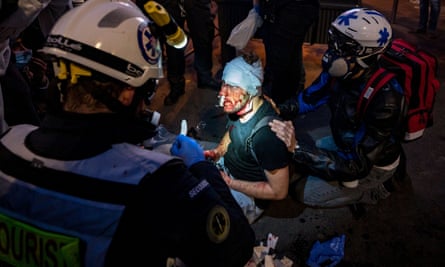A Brief Colonial History Of Ceylon(SriLanka)
Sri Lanka: One Island Two Nations
A Brief Colonial History Of Ceylon(SriLanka)
Sri Lanka: One Island Two Nations
(Full Story)
Search This Blog
Back to 500BC.
==========================
Thiranjala Weerasinghe sj.- One Island Two Nations
?????????????????????????????????????????????????Wednesday, December 2, 2020
French inquiry begins into alleged assault on photographer by police
Officer allegedly hit Ameer al-Halbi in the face while he was covering Paris protest against security law
French investigators have opened an internal inquiry into how a Syrian photographer covering a demonstration in Paris was seriously injured, amid a heated national debate over police violence.
Ameer al-Halbi was pictured with blood pouring from his bandaged head on Saturday after a police officer allegedly hit the journalist in the face with a truncheon.
Halbi, 24, was covering a protest against the controversial global security law in the city on Saturday, which passed off peacefully before clashes between police and casseurs, black-clad young people who torched cars, a brasserie and smashed shop windows.
French authorities have confirmed the Inspection Générale de la Police Nationale (IGPN) – known as the police of the police – have been asked to look into how the photographer from Aleppo, who has been living in France for three years, was injured.
Reporters Sans Frontières (RSF) and the news agency AFP, for whom he often worked, condemned the alleged attack and demanded an inquiry. Representatives of the national journalists’ union SNJ-SGT said police and the interior minister, Gérald Darmanin, should apologise.
François Pallud, who was at the protest with Halbi, told Le Monde: “He was in the street with other photojournalists. To avoid getting in the way of the police charge they were flattened against the wall … shouting ‘press, press’. During the charge a CRS [riot police officer] broke rank very briefly and hit him in the face with a truncheon. It wasn’t what you’d call a beating, it lasted only about a second.”
Pallud suggested police targeted Halbi because he was spotted photographing a demonstrator being hit by a police officer. Christophe Deloire, RSF’s secretary general, wrote on Twitter: “Ameer came to France from Syria for safety, like several other Syrian journalists. The country of human rights shouldn’t be threatening him but protecting him.”
Halbi, a prize-winning photographer, said he was not wearing any protective clothing or equipment because police had confiscated it while he was covering the gilets jaunes protests in 2018. He also said he did not have a press card.
The investigation is the latest in a series to focus on allegations of police violence, including cases involving officers being filmed beating a music producer, tripping up a migrant and targeting a journalist.
During the gilets jaunes protests that started in 2018 and continued until the first Covid-19 lockdown in March this year, police used rubber bullets known as LBD against protesters, causing serious injuries, including blindness and loss of limbs. Official figures suggest 2,495 protesters and 1,944 police, gendarmes and firefighters were injured in 16 months of almost weekly demonstrations.
The investigative website Mediapart also published a video from April 2019 showing eight plainclothed police in unmarked vehicles surrounding a car near the Bois de Boulogne and shooting inside, narrowly missing the driver.
RSF has lodged a legal complaint against the Paris police chief, Didier Lallement, over police allegedly targeting journalists during an operation to dismantle a refugee camp last week.
On Monday, the French government announced in a U-turn that it would completely rewrite the contested article 24 of the global security law, which gives police new powers. Officials said the legislation, which has already been passed by the Assemblée Nationale, has been wrongly perceived as a threat to press freedom.
After an unscheduled meeting with the president, Emmanuel Macron, the hardline Darmanin – a vocal supporter of the law including article 24 – told a parliamentary commission the violent acts were those of “individuals”, not the entire force, and denied there was a culture of violence among forces of law and order. He admitted several “fundamental mistakes”, including failing in police training and a lack of equipment, but denied there was a “divorce between the police and the population”.
He added article 24 was aimed at guaranteeing police safety after a number of attacks on officers. “The protection of police and the protection of the freedom of press are not in competition,” Darmanin said.


